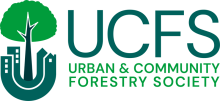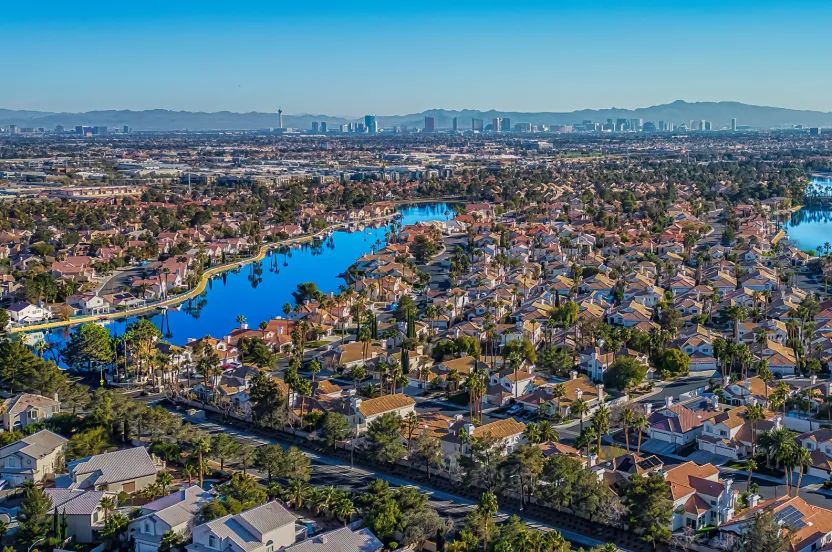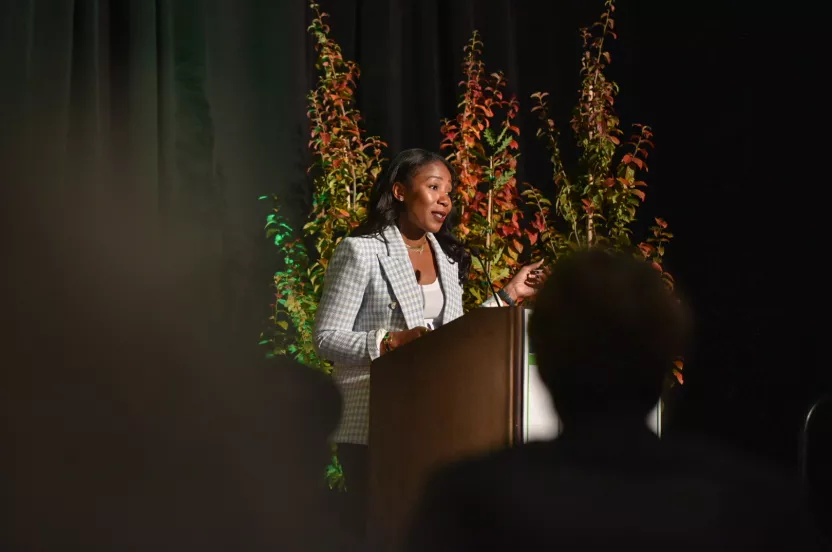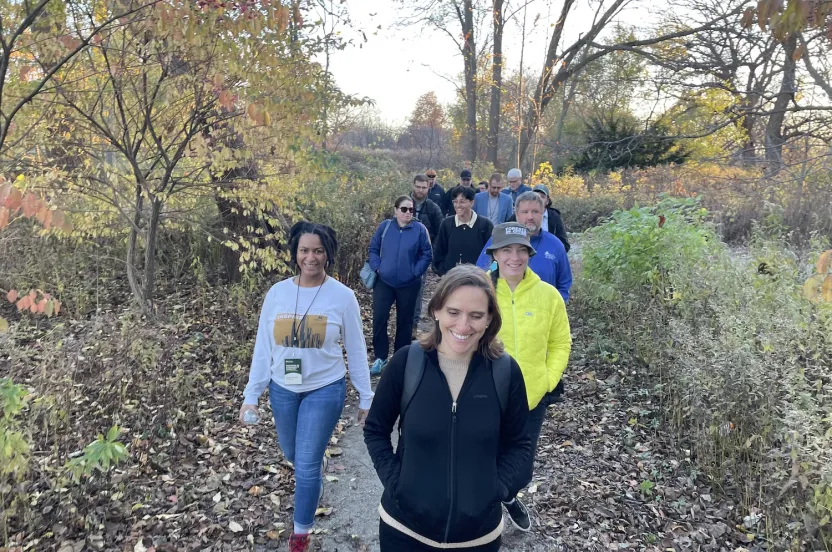Give before midnight on July 31 to double your impact where trees need us most. CHOOSE A PROJECT
Urban and Community Forestry Society
November 17-18, 2025
A chance to be with your tree people who understand the challenges and triumphs of being an urban or community forester.

Location
Henderson, NV
Date
November 17-18, 2025
Type
Event

Presented by the Urban and Community Forestry Society
Join Us!
Each year, the Urban and Community Forestry Society (UCFS) hosts a conference and tradeshow. The UCFS is a membership-based organization that works to build the confidence, competence, and camaraderie of all professionals who manage trees and forests to create and sustain more livable communities.
If you are a professional who makes a daily tree stewardship decision for a community of any size, we welcome you to this Society and this conference.

Event Information
This exciting conference brings together members and non-members alike to network, learn, and share knowledge. Presentations from experts in the field, city tours, networking receptions, and more make this a can't-miss event! The conference is held in conjunction with the Partners in Community Forestry Conference. We hope to see you in Henderson!
This conference offers:
- Real-world case studies of urban and community forestry in action
- Knowledge sharing and peer-to-peer learning
- A chance to be with tree people who understand the challenges and triumphs of being an urban or community forester
2025 Agenda | Details subject to change.
Monday, Nov. 17
Join the Urban and Community Forestry Society (UCFS) and City of Henderson Parks and Recreation for a half-day bus tour exploring how urban forestry practices are evolving to meet the challenges of a hotter, drier climate. This tour is designed for practitioners, planners, and policymakers interested in practical, replicable strategies for building climate-resilient urban landscapes with limited water resources.
Throughout the tour, we'll explore how cities can proactively adapt to aridification by redesigning public spaces, rethinking irrigation systems, and collaborating across departments and with community partners. Expect a balance of big-picture strategy and actionable detail. See website for more details.
Pre-registration required. Fee of $50 for UCFS Members, $55 for non-members
Help raise money for the UCFS Urban Forest Foundation, plus have fun and get some fresh air! The annual UCFS Fun Run/Walk is approximately 2 miles/3.2 km for the Run and 1 mile/1.6 km for the Walk — and anyone is welcome to come hang out and watch. Proceeds will go to the UCFS Urban Forest Foundation, which supports scholarships for MFI and the UCFS Arborist Exchange program. Registered participants also receive a T-shirt!
Additional $30 registration fee
Join the Municipal Forestry Institute Reunion to reconnect with friends in your MFI class and meet MFI grads from other years. Bring a friend who might be interested in participating in a future MFI class! New this year – a portion of your ticket price will go to support the UCFS Urban Forest Foundation, which provides scholarships for urban foresters to attend MFI!
Additional fee of $25 per ticket with payment accepted at the door.
Tuesday, Nov. 18
7 a.m. - 4 p.m. | Registration
7 a.m. - 8 a.m. | Breakfast with the Exhibitors
7 a.m. - 8 a.m. | First-Time Attendees Breakfast with UCFS Members and Friends
8:00 a.m. - 8:10 a.m. | Welcome
Jamie King, Director of Coaching and Consulting, Field Delivery, American Forests, and UCFS Board of Directors President
Leslie Berckes, Executive Director, Urban and Community Forestry Society
8:10 a.m. - 8:40 a.m. | Welcome from the Host City
Preston Goodman, Municipal Forester, City of Henderson, Nevada
Planting trees in the desert takes determination and ingenuity. As our climate changes and increasing heat impacts us all, the need for trees has never been greater. With that comes a high demand for water to ensure the trees thrive. So, how does this desert city make it work? Learn more about this and other urban forestry challenges and triumphs in Henderson.
Robin Schultze, Principal Planner/Arborist, City of Durham, North Carolina
Durham is one of the fastest growing areas in the U.S.; this has led to a rapid increase in new residential developments (and by extension, thousands of acres of land mass graded and tree canopy lost). This presentation will seek to provide insight into how the Durham Planning Department worked with other city departments, elected officials, environmental groups, and development professionals to write a new tree preservation ordinance. This process revealed the tension in attempting to balance the need for housing while still trying to meet the community's adopted tree canopy goal of 55% canopy coverage within our Urban Growth Boundary.
9:25 a.m. - 10:00 a.m. | Break
Jessie Farris, Arborist Project Coordinator, City of Dallas, Texas
This session explores five years of data from Branch Out Dallas, a city-led tree giveaway program. Branch Out Dallas is the City of Dallas’s annual residential tree giveaway program launched in 2019 to expand the urban canopy, promote equity, and engage residents in climate action. Over five years, more than 10,000 trees have been distributed, but until now, little research has examined the long-term outcomes of this widely replicated model. Learn how demographic trends, community surveys, and species tracking informed program improvements. Discover actionable strategies for equity-focused outreach, public education, and long-term success in building resilient urban forests through community-driven stewardship.
David Lefcourt, City Arborist/Tree Warden, City of Cambridge, Massachusetts
Trying to avoid damage to trees during construction is a constant battle in many municipalities. Learn how the City of Cambridge's Urban Forestry program has reduced tree damage in regard to construction throughout the city. From pre-construction walks and meetings, tree protection, air spading and plant healthcare to preventative tree pruning and innovative construction methods, the City has managed to reduce damage to trees. Practices that seem routine now took years to get accepted and implemented by other city departments and contractors. David Lefcourt, City Arborist and Tree Warden, will share his experiences with trees and construction during his 17+ years with the City.
11:30 a.m. - 1:00 p.m. | Lunch and Awards Ceremony
UCFS Member and Friends are a wealth of knowledge. During these Canopy Conversations, participants will be able to pick from a variety of topics that they most want to learn about and discuss with fellow participants. Each topic area will be led by an expert in the field who will briefly present on the issue. Then, it’s time to learn from one another! A moderator will lead the group in discussion. Share what has worked — and not worked — in your experience.
Each Canopy Conversation will be 30 minutes long with 10 minutes for wrap-up and transition. Participants will have the opportunity to choose three topics in this time frame.
Canopy Conversations will feature the following topics and conversation leaders:
- IRA and funding loss | To be announced
- Managing trees with limited water | Nicole Gillett, City of Tucson, Arizona
- Tree protection ordinances | Lee Mueller, Davey Resource Group
- Urban wood | To be announced
- Volunteer training and community engagement | Joe Wheelock, Heartland Tree Alliance
- Nursery/growing your own trees | Meridith Perkins, Forest ReLeaf of Missouri
- Partnership development | Jamie King, American Forests
- Wildfire/urban canopy | Ian Appow, Upper Willamette Soil & Water Conservation District
- Non-profit/government relationships | Maggio Laquidara, North Carolina State University
- Student/youth engagement | Emma Stammer, Treasure Valley Canopy Network
3:00 p.m. - 3:30 p.m. | Break
During this session, three panelists will discuss how your work can ensure your trees are climate-ready. Group discussion and Q&A will be included.
Becky Schwartz, Director, Urban Forestry Innovation, American Forests
As forest health challenges continue to grow with a changing climate, American Forests presents a best-in-class, climate-forward resource to bridge the urban forest health resource and resilience gap across the US. This resource, developed by American Forests with the U.S. Forest Service, is a new Forest Health
section on Vibrant Cities Lab.
Camille Shoaf, Lead Campus Planner, Purdue University
A nationwide survey indicates that while communities are taking steps to adapt urban forests, tree managers feel that more should be done. Communities whose level of concern aligns with their leadership show higher adoption rates. Understanding these factors can help tree managers prioritize resources for healthier future urban forests and communities.
Jim Clark, Managing Consulting Arborist, HortScience Bartlett Consulting
Urban foresters are challenged to identify species that will be adapted to future climate conditions. Responding to this challenge requires 1) understanding what those conditions will be, 2) evaluating an existing species palette for adaptability to those conditions, and 3) identifying new species adapted to the future climate. Jim will describe a process for identifying tree species — through local, regional, and national assessments — that will be adapted to future climate conditions.
Jamie King, Director of Coaching and Consulting, Field Delivery, American Forests and UCFS Board of Directors President
Jamie King, Director of Coaching and Consulting, Field Delivery, American Forests and UCFS Board of Directors President
Urban and Community Forestry Society Members are invited to the annual member meeting. Hear from Society leadership on the status of the organization, new initiatives, and the long-term strategic direction of UCFS. Members will have an opportunity to ask questions and discuss issues that are of importance to them.
Details coming soon.
Join a meet-up and social for LGBTQIA+ urban forestry professionals!


